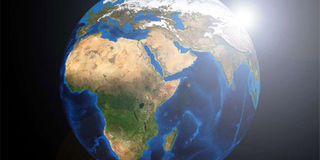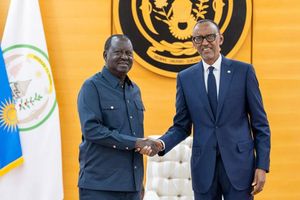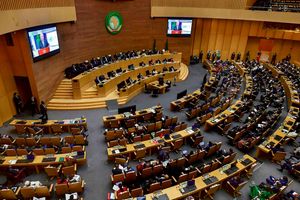
Multipolarity is about democratising global governance to remove its glaring “democratic deficit.”
The global governance system is on the cusp of a seismic transition. The world is trapped in ‘the geopolitics of interregnum’: the old western-dominated global order is dying, but a new democratic multipolar system is yet to be born. This is what emerged from two important forums, which I addressed in Beijing this week.
I was a guest speaker at “The Third International Forum on Democracy: The Shared Human Values” organised by the Chinese Academy of Social Sciences on March 20, 2024. The next day, I spoke on “Exploring Media and Cultural Exchanges Between China and Africa” at the Schwarzman College at Tsinghua University — “the Harvard of China”.
In April 2013, US Presidents Barrack Obama and his Chinese counterpart, Xi Jinping, launched the Schwarzman Scholars Program “to forge ties and fortify the foundation” of China-America cooperation.
This program was emblematic of the age of what German economist Moritz Schularick and British historian Niall Ferguson described as ‘Chimerica’ — a combination of ‘China’ and ‘America’ — that described the closely interlocked economies of China and the US in the 1996-2006 decade. “Chimerica” ended in a tragic divorce, triggering a new Cold War between America and China. A fierce battle of ideas between ‘hegemony’ and ‘multipolarity.’
In its new National Security Strategy, unveiled in October 2022, Joe Biden’s America has shrilly returned to the Cold War-era geopolitics. Washington imagines itself as the white knight rescuing democracy from a ‘global authoritarian’ surge. Inversely, an assertive China is leading the Global South in a multipronged strategy to challenge Western hegemony in global geopolitics.
According to the hegemonic theory, developed by the Italian Marxist philosopher Antonio Gramsci, a dominant power with unsurpassed military, political, and economic muscle is crucial to maintain global peace.
The China-led BRICS — Brazil, Russia, India, China and South Africa — disagree. Instead, the rising global South envisions a non-hegemonic future, and is pushing for the reform of the existing global governance system to create a democratic multipolar world.
The BRICS is contesting the victors’ order that the US-led West imposed over the rest of the world after 1945. The World Bank, the IMF, the UN and other post-War institutions of global governance are neither inclusive nor democratic. The current global governance is distinctly authoritarian.
The West is on the table while the rest of the world is on the menu. Only multipolarity can change all this. A multipolar world means five interrelated shifts to foster harmony, fair and just rules, equality and greater interdependence among states.
First, multipolarity is about democratising global governance to remove its glaring “democratic deficit.” What Samuel Huntington theorised as ‘three distinct waves of democratisation’ were about transforming the state, not expanding global democracy.
On the global landscape, might is right. States wield unequal powers, and are grouped according to their “strength.” In a multipolar world, states are equal and observe the principles of the UN Charter.
Second, multipolarity champions economic democratisation and inclusive globalisation. Under western hegemony, globalisation perpetrated ‘beggar-thy-neighbour’ policies and inequalities in power and resources.
Globalisation should be universal, inclusive and beneficial to all. In a multipolar world, economic globalisation should grow the economic pie, sharing it in a fair, just fashion to reduce poverty and inequality. Multipolarity is an effective counter to unilateralism, protectionism, isolationism and other anti-globalisation trends.
Three, multipolarity is about reforming existing multilateral institutions to make them more inclusive and democratic. Multilateralism should foster a rules-based world. Global institutions should never be used to impose a one-shoe-fits-all models such as the ruinous Structural Adjustment Programmes imposed on Africa by the IMF, resulting in the lost decades (1980s and 1990s). Multipolarity means inclusion of the South in global policymaking. The “all-subjected” and “all affected” principles require that the South is fairly and justly on the table of global governance, not on the menu.
Four, multipolarity calls for the integration of institutions of the South into global governance. Multilateral initiatives of the global South such as BRICs should not be seen as creating disarray and balkanising the world into multiple blocs. They are more about recognising the value of unity in diversity. They are important in regional and global governance.
China has proposed four initiatives in support of global economic stability, peace and harmony. The first is Belt and Road Initiative to connect the world through modern infrastructure. Second is the Global Development Initiative to help the global community and UN to achieve the 2030 Sustainable Development Goals. Third, the Global Security Initiative to advance the course of global stability and addressed common security challenges. Finally, the Global Civilization Initiative to enhance unity in diversity among human civilisations.
Finally, multipolarity means bolstering the institutions of China-Africa cooperation. Over the past two decades, an effective architecture of China-Africa cooperation in development has emerged. In January, Egypt and Ethiopia joined South Africa as members of the BRICS.
Later this year, China will host African countries and organisations in the tri-annual Summit of the Forum on China — Africa Cooperation (FOCAC) in Beijing. Today, 52 out of 55 AU-member states are participating in BRI, part of China’s framework of delivering global public goods. Through the FOCAC-BRI framework, China has channeled over $200 billion to support Africa’s development and inclusion into the global markets in the 2000-2021 period. As a result, once dismissed by investors as a “hopeless continent”, Africa today is a “hopeful continent” on the rise.
Ahead of the FOCAC summit, focus should be on cooperation in new technologies in energy, hi-tech manufacturing and AI — codenamed “new quality productive forces” — to spur “high-quality growth.” New technologies will accelerate rolling out of African Agenda 2063 and the African Continental Free Trade Area.
Africa’s inclusion into global economy and governance in a multipolar world calls for greater cooperation in new technologies to break the poverty trap.
- Prof Peter Kagwanja is CEO at the Africa Policy Institute. This is an excerpt of a presentation in Beijing, on March 20, 2024.









